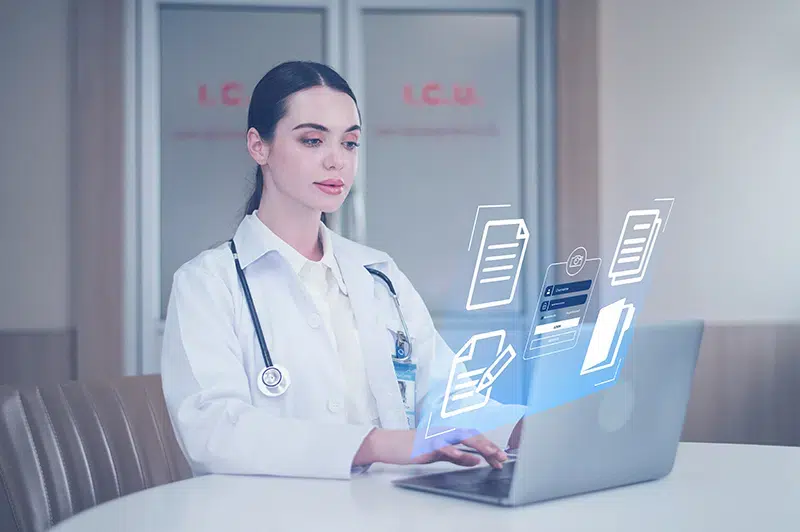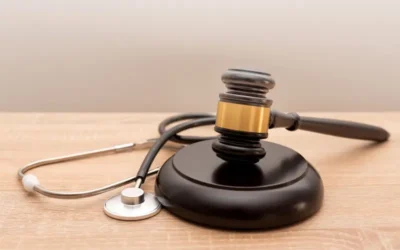OCR (Optical Character Recognition) technology is of great significance when it comes to medical record retrieval for legal use. Retrieving voluminous medical records is a tedious and time-consuming process for busy law firms. The legal team comprising paralegals and legal assistants must retrieve health provider records as well as billing records for each medical treatment provided. OCR is a game-changer with regard to medical record retrieval and helps legal entities get the medical records they need promptly and efficiently. Let us look at how OCR technology is revolutionizing the way attorneys handle medical records, and how it is beneficial for both legal entities and their clients.
Managed Outsource Solutions provides value-added medical record retrieval services for attorneys.
Contact us at 1-800-670-2809 today!
How OCR Aids in Medical Record Retrieval and Review for Attorneys
OCR technology involves the conversion of scanned or photographed documents into editable and searchable text. By using sophisticated algorithms, OCR software recognizes characters, words, and entire documents, making it possible to extract information from non-searchable documents, such as scanned images or PDFs. Once converted, the text can be indexed, searched, and manipulated, enabling attorneys to quickly identify relevant information within large volumes of medical records. Attorneys find this technology beneficial because if successfully extracts the most important parts of the client’s medical history and records. OCR can immediately find the medical history relevant to the particular client’s case, thereby saving attorneys valuable time and effort spent on searching through the medical documents. Here is a list of the key advantages of using OCR technology for medical records retrieval and review.
- Improved efficiency: Traditional medical records retrieval and information extraction involved time-consuming manual processes such as reading through thousands of pages or manually searching for specific terms. OCR technology automates this process, enabling attorneys to swiftly scan and search through records, significantly reducing the time spent on document review.
- Comprehensive and accurate data extraction: OCR ensures high accuracy in extracting text from medical records, minimizing the risk of errors caused by human transcription. Attorneys can retrieve key data points, such as patient demographics, medical diagnoses, medications, treatment plans, and other relevant information, with precision and speed. This comprehensive data extraction enables attorneys to build strong cases based on reliable and organized information.
- Improved Organization and Accessibility: OCR software not only converts medical records into searchable text but also facilitates the organization and categorization of extracted data. Attorneys can tag and label specific sections or relevant details, making it easier to retrieve specific information at a later stage. Moreover, OCR technology enables seamless integration with existing document management systems, ensuring secure and efficient storage and retrieval of records.
- Efficient Medical Record Review and Analysis: OCR technology empowers attorneys to review and analyze large volumes of medical records more efficiently. With the ability to search for specific terms or phrases, attorneys can quickly identify critical information, anomalies, or patterns that may support their legal arguments or reveal potential areas of interest. This accelerated review process allows attorneys to focus on the relevant aspects of the case, saving time and improving the overall quality of legal representation.
- Collaboration and Sharing: OCR technology facilitates collaboration among legal professionals by enabling easy sharing and distribution of medical records. Attorneys can extract relevant sections, highlight specific details, and share the information with clients, experts, or other team members. This seamless collaboration ensures that everyone involved has access to the necessary information, fostering a more informed and collaborative approach to legal proceedings.
OCR technology can also facilitate indexing, medical record organization, and Bates labeling.
Are There Challenges Involved?
While OCR technology offers substantial benefits, it is important to recognize certain challenges and considerations:
- Quality of Source Documents: The accuracy and effectiveness of OCR technology depend on the quality of the source documents. Illegible handwriting, poor-quality scans, or document formatting issues may affect the accuracy of text recognition. Attorneys must ensure that medical records are clear and legible to maximize the effectiveness of this technology.
- Privacy and Security: Medical records contain sensitive and confidential patient information. Attorneys must exercise caution when using OCR technology to ensure compliance with privacy regulations and implement appropriate security measures to safeguard the data.
- Contextual Understanding: OCR technology excels at extracting and organizing text but may not fully grasp the context or meaning behind the extracted information. Attorneys must carefully review and analyze the data to ensure accurate interpretation and avoid misinterpretations.
It is evident that OCR technology has become a valuable tool for attorneys involved in retrieving medical records. By automating the conversion of non-searchable documents into searchable and editable text, OCR technology significantly enhances efficiency, accuracy, and organization. Medical Record Review for Attorneys becomes easier because it enables extraction of key information from large volumes of records, while also facilitating efficient data analysis, and helping attorneys build stronger cases for their clients. While OCR technology brings undeniable advantages, it is essential for legal professionals to remain vigilant about document quality, privacy concerns, and contextual understanding. As OCR technology continues to advance, attorneys will undoubtedly benefit from its continued integration into their daily practice, transforming the way medical records are retrieved and utilized in legal proceedings.
Looking for accurate medical record review for attorneys? Work with a leader in the industry!
Contact us at 1-800-670-2809 today!




